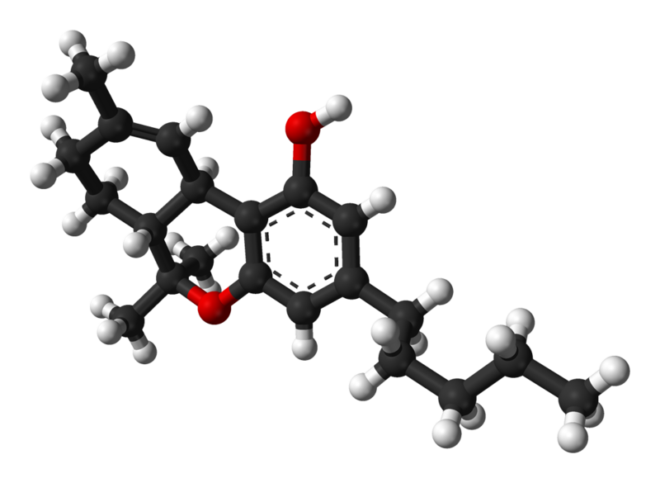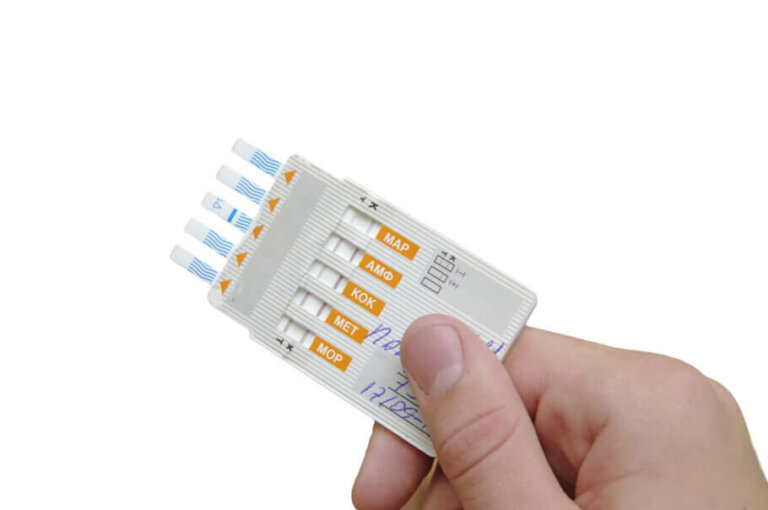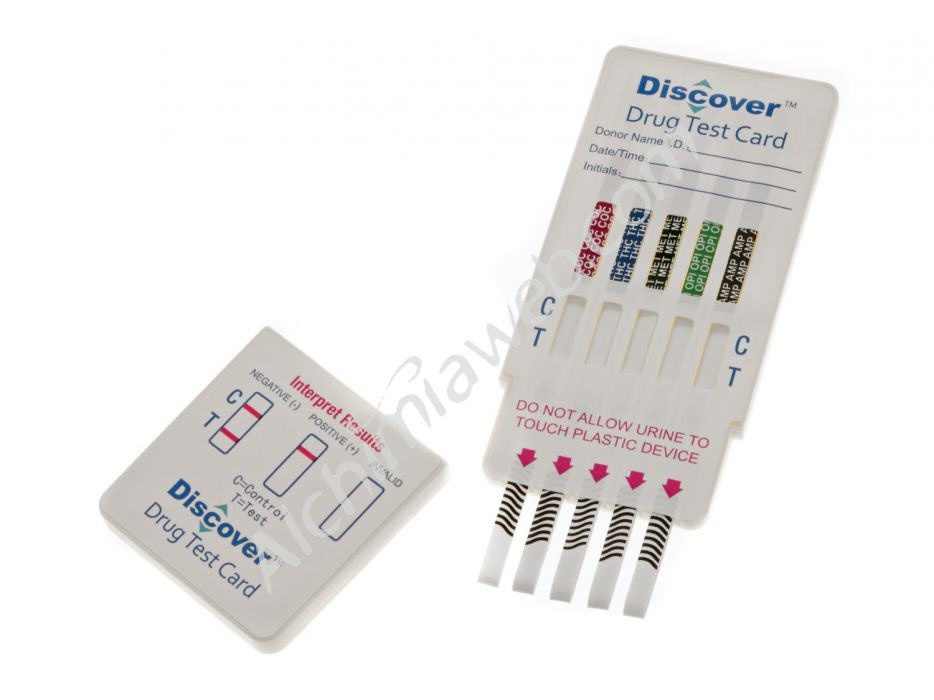THC and urine tests - How to pass them?
List of contents
In recent years, the use of marijuana for both recreational and medicinal purposes has experienced a significant increase in several countries. As the legalization and social acceptance of this substance grow, more concerns arise among users about its detection in the body, especially in situations that require drug tests, such as the workplace or driving.
As you probably know, one of the most common methods for detecting the presence of cannabis in the body is urine tests. This particular type of test has been widely used due to its relative ease of use, low cost, and ability to provide information on the presence of THC (tetrahydrocannabinol) in the body, the main psychoactive compound in cannabis.
In this article, we will explore in detail how THC urine tests work, their advantages and limitations, as well as some factors that can influence the results. We will also address relevant aspects related to the duration of the detection of THC in urine and the legal and social implications associated with these tests.

THC urine test, an increasingly common test
As we have mentioned, in recent years there has been a significant increase in urine tests to detect the presence of THC, the main psychoactive component of cannabis. This trend has been observed both in the workplace and in other contexts, and how could it be otherwise, has generated a debate on privacy and individual rights.
We have also seen how this increase in urine testing for THC is due, in part, to the increasing acceptance and legalization of marijuana in some places. It is logical; As more countries and states have legalized the medical and recreational use of marijuana, companies, and organizations have adopted stricter policies to ensure safety and regulatory compliance, for example, by implementing drug testing on the road.
Well, among the various types of tests that can be done, urine tests have become one of the most common ways to detect recent cannabis use, since THC metabolites are eliminated through urine. Additionally, these tests are usually quick and relatively inexpensive, making them a popular option for many organizations.
However, the increasing prevalence of urinalysis has also raised concerns about invasion of privacy and individual rights. Some people argue that using marijuana outside of work hours should not be grounds for termination or discrimination, especially in places where its use is legal. In addition, there is evidence that THC metabolites can remain in the system for a long period of time, which can lead to positive results even in people who have not used it recently and are not under the influence in any way.
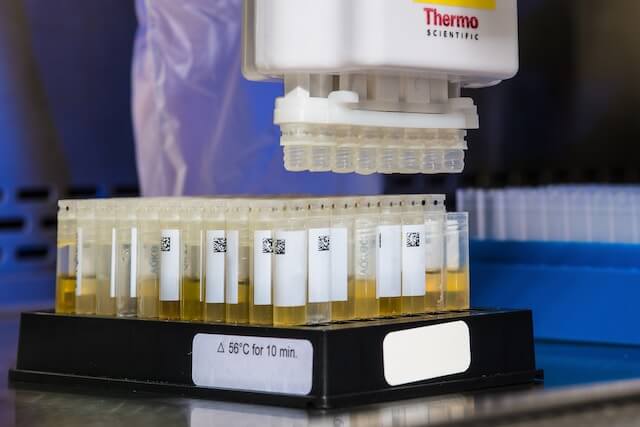
In summary, this clear increase in urine tests for THC reflects both the growing acceptance of this substance on the one hand and the concern about its consumption on the other, especially while performing certain tasks. As legalization continues to spread, it is likely that this issue will continue to generate debate and more accurate and equitable alternatives to assess cannabis use in different contexts will be sought. We hope so!
How does THC affect the urinary system?
After THC is consumed, whether through smoking, vaping, eating cannabis-infused food, or other forms of consumption, it is absorbed into the bloodstream. As it circulates through the body, THC is metabolized by the liver into several metabolites, the main one being 11-nor-9-carboxy-THC (THC-COOH).
THC-COOH, unlike active THC, is water soluble and can be eliminated from the body through urine. The excretion of THC metabolites is a gradual process that can take time, and its duration varies depending on various factors, such as the frequency and amount of consumption, individual metabolism, and other physiological factors.
Test kits or dipsticks are designed to detect the presence of THC-COOH in urine, indicating that THC has been recently consumed. These tests usually do not directly detect active THC, but rather its metabolites, as these remain in the body longer than THC itself.
Tetrahydrocannabinol (THC): The principal cannabinoid in cannabis
THC or tetrahydrocannabinol is the main constituent of cannabis, responsible for its psychoactive effects. In this post we tell you more about one of the best known cannabinoids, exclusive from the cannabis plant and useful for many patients who benefit from the socalled entourage effect, that is to say, the synergy created by different compounds like THC and CBD acting together.
It is important to note that THC metabolites can be detected in urine for a long period of time, sometimes even weeks or months, depending on a number of factors. This means that a urine test can result positive for THC even if the consumption took place some time ago and the person is no longer intoxicated, something that the authorities in charge of evaluating these tests usually ignore.
Thus, the excretion of THC and its metabolites through the urinary system is the primary mechanism for detecting marijuana use in urine tests. Water soluble metabolites, such as THC-COOH, are gradually eliminated from the body through the urine and can be detected by specific tests designed for that purpose.
How is a THC urine test done?
Typically, this type of test is performed using test strips or test kits that are specifically designed for that purpose. This is usually the procedure:
- Sample Collection: The individual must provide a urine sample in a clean container provided by the testing organization or laboratory. It is important to follow the instructions on how to collect the sample to avoid possible contamination or errors. The sample is usually required to be taken mid-urinate, and it is preferable to perform the test first thing in the morning.
- Sample preparation: If a test kit with a test strip is used, the strip is immersed in the urine sample for the time specified in the instructions. Some strips may have an absorption part or a sample collection window where the urine is placed directly, similar to the Covid tests that you have surely seen and used.
- Chemical reaction: Test strips contain chemicals sensitive to THC and its metabolites. If THC is present in the urine sample, a chemical reaction will occur on the strip. This reaction may manifest as a color change on the strip or an indication in a reading window, depending on the type of test.
- Interpretation of results: After the specified reaction time has elapsed, the result should be compared with the guide provided in the test kit. Usually, there are different levels or lines on the test strip indicating different THC concentrations or a negative result, if that is the case.
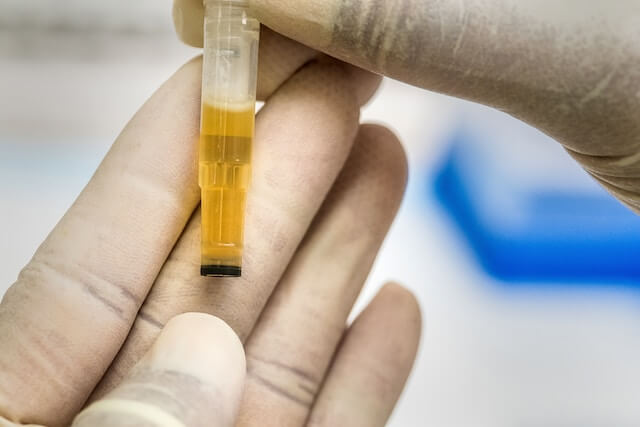
It is important to note that the results of urine tests for THC are indicative of recent use, but do not provide information about the level of intoxication at the time of the test. In addition, there are differences in the sensitivity and precision of the different test methods, so the results should always be interpreted with caution and considering other relevant factors. At least, that's how it should be!
How long does THC last in urine?
The detection time of each substance in the body varies greatly depending on its composition, so we can find some that can be detected in the urine up to 30 days after being ingested (and even if its effect is only noticeable for a few hours after consumption), while others are no longer detectable after a week or less.
Unfortunately, compared to other substances such as amphetamines, cocaine, alcohol, or opiates, it is precisely cannabis that remains in the urine the longest, about a month.
Detox products to eliminate toxins from your body
Detox products are becoming more and more common on the market, due to the increasing number of people who need - or simply want - to eliminate the toxins present in their bodies. Today we present some of the most practical and effective options available on the market and offer some details about their use.
However, it should also be mentioned that this time depends on various aspects apart from the composition of the substance itself. For example, we can find factors such as each person's own metabolism, as well as their age or level of body fat, and also the diet, or other habits such as sports.
Pass a urine drug test
In order to eliminate toxins accumulated in the body, there are many diets and products that help to achieve a thorough cleaning. Surely the Detox concept sounds familiar to you! From fruit and vegetable mixtures to products specifically formulated for this purpose, the offer of toxin purifiers on the market is wide, with solutions such as Kleaner, Zydot, Magnum Detox, or High Voltage.
In addition, there are other alternatives in case you have to pass a urine drug test, although it is not always possible to use them. We are talking about products such as silicone penises, which together with synthetic urine bags can represent a good solution in some cases. However, although they are a perfect alternative in certain situations, it will always be better not to have to resort to them and to be able to present a reliable sample free of toxins!

















































